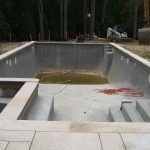5 Tips for Proper Winter Pool Care
The winter season looks different for every pool owner. Some people witness blankets of snow and freezing temperatures, while others see the sun each day and deal with temperatures no lower than 50 degrees Fahrenheit. Even though pool usage typically ends shortly after Labor Day, caring for your pool is still a year-round responsibility. Performing proper winter pool maintenance is essential to your pool’s well-being, which consequently keeps more money in your wallet. Continue reading this article to learn the top 5 tips for proper winter pool care, brought to you by the No.1 pool servicing company in Connecticut and New York
1) When Should You Close Your Pool for Winter?
Pools typically open on Memorial Day and remain open until early September. Depending on where you live, there might not be a need to close the pool. If harsh cold and snow are common during the winter months, consider closing your pool.
First, pay attention to the temperatures at night. Start to shut the pool equipment off when the overnight temperature drops down to 30 degrees Fahrenheit or lower. Also, if you have a pool cleaning robot or any type of products that remain submerged, read the manuals for how to care for them for the duration of the winter season. No one wants to have to replace expensive products because they froze. Remember, you want to make the pool opening process as seamless as possible so you can spend more time soaking up some sun.
2) Cover Your Pool
Invest in a quality pool cover, preferably automatic, if you haven’t already made the investment. These covers help prevent any debris, rainwater, snow, and ice from entering your already clean pool. This is where cleaning off the cover during the off-season becomes beneficial. There’s no need to create more work for yourself when it’s time to reopen the pool again. Also, triple-check that the pool cover tightly fits over your entire pool. Since snow and ice put extra stress on the cover, the cover may slip off in the middle of winter unless properly fitted. Make sure that your cover is attached with lawn anchors or weighed down by a sturdy object such as a water bag.
3) Drain Some of the Pool Water
During the summer months, the water inside your pool will evaporate due to the heat. But once winter rolls in, water freezes and may damage the tile or plaster finish. To prevent any damage to your pool, drain some of the water. You don’t need to empty the pool, but the water level needs to be four to six inches below the pool skimmer. Although, if you live in a warmer climate and don’t experience rough winters, the water level should be almost to the top. Even though it seems tedious, this tip will hinder you from spending any money on repairs.
4) Keep the Chemical Levels Balanced
Making sure that the chemicals within the water are steady seems exhausting and dreadful to do in the cold, but it is paramount to protecting your pool. Test the water at least once a week to confirm the pH levels and chlorine are stable. On the positive, there should not be a need to add chlorine since your pool will be out of use and lack any type of circulation.
Furthermore, the added chlorine will keep it clean until you take the cover off in the late spring or early summer. Still, imbalances may happen for several reasons. For example, cloudy water, algae in the pool water, improper filtration, and high amounts of chlorine can cause the chemical levels to be unbalanced. Make sure to do your best to keep track of the chemical balance.
5) Prevent Frozen Pool Pipes
Not only does the drop in temperatures affect the actual pool, but the filtration system and equipment are also affected. Make sure to drain all the water from the pump, heater, and filter to prevent the pipes from expanding and cracking. If freezing happens without properly preparing your pool equipment, check around the poolside for any visible cracks or loose tiles. First, remove the lid and rain the plugs.
Next, take out the drain plugs that are in the filter and any other unit, such as a leaf trap. Then, check the valves and if possible, open the valves so water can move through the pipe. If you check the poolside and necessary pipes on the pump, contact a professional to make sure there isn’t any other damage that you did not see. Remember to keep a close eye on plummeting temperatures to save yourself from expensive repairs to pool equipment.
Shoreline Pools is Here to Help with Winter Pool Care
Understanding proper pool care during the winter months is equally as essential as it is in the summer season. Beginning with draining some of the water, checking the chemicals weekly, and preventing the pipes from freezing, will all ease the overall care throughout the winter season. Contact Shoreline Pools at (203) 357-1544 for their expertise with proper winter pool care.





